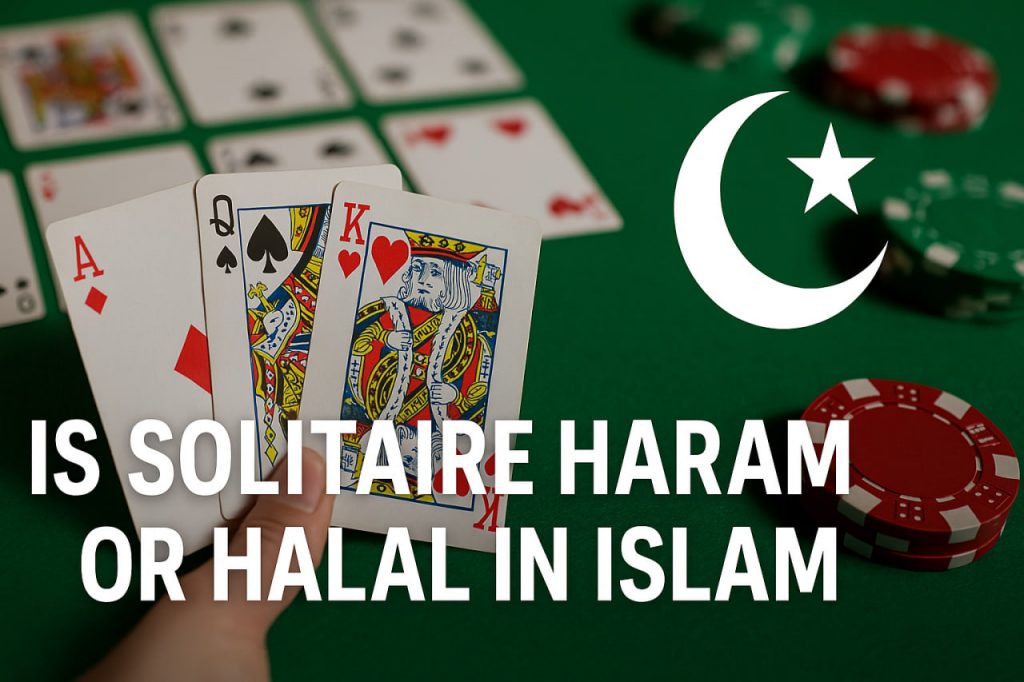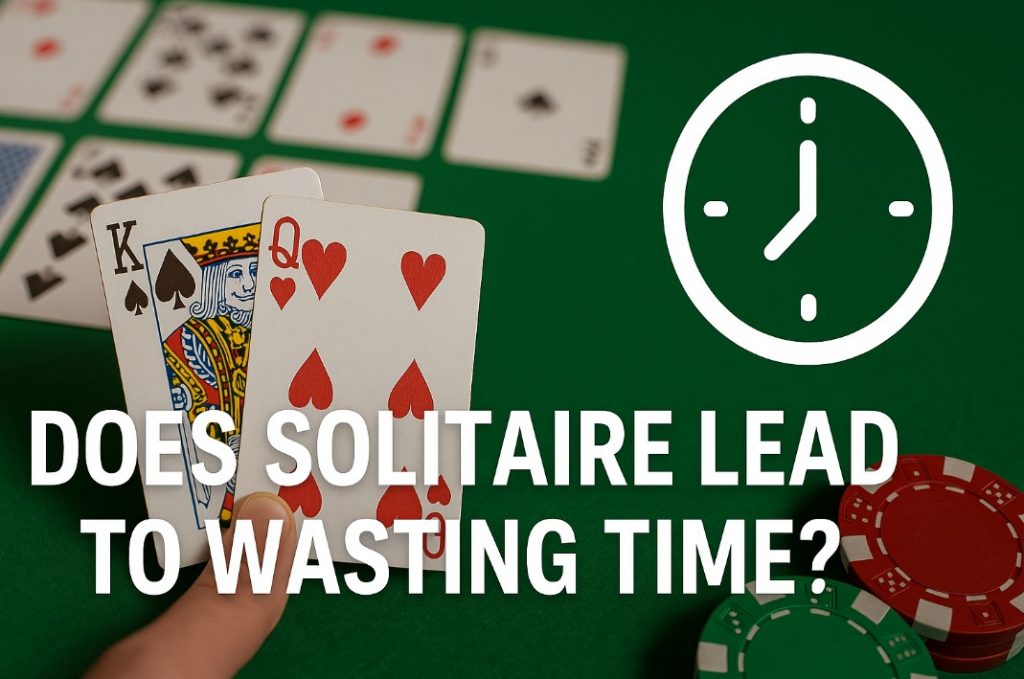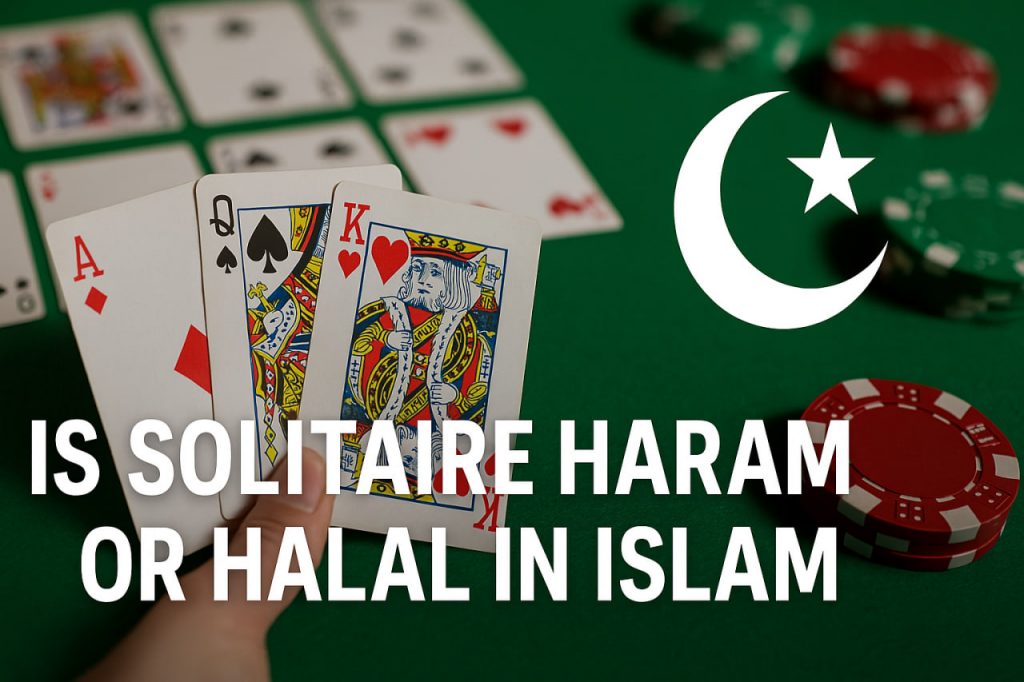Is Solitaire Haram or Halal in Islam?

In today’s fast-paced, digitally driven world, entertainment has taken on many new forms. Among the many ways people relax and enjoy their leisure time, classic digital games like Solitaire remain incredibly popular. Originally a simple card game requiring a deck of cards and some quiet time, Solitaire is now available on virtually every computer, smartphone, and tablet. With its growing popularity, particularly among Muslims looking for wholesome and relaxing leisure activities, a critical question arises: Is Solitaire haram or halal in Islam? This article dives deep into that question from various Islamic perspectives, offering detailed insights, scholarly opinions, and practical guidelines to help Muslims make informed decisions in both spiritual and practical contexts.
Understanding Solitaire
Solitaire is a card game designed for a single player. Traditionally played with a physical deck of cards, it has now become a staple on digital platforms. It requires logical thinking, patience, and a bit of strategy to win. The objective is to move all cards to foundation piles in a certain sequence. Many people play Solitaire to unwind, pass the time, or sharpen their minds.
It is particularly appealing because it does not require other players, making it convenient for solo entertainment. Its minimal interface and the sense of achievement in successfully solving the puzzle also make it a mentally rewarding game for many.
Popular Variants of Solitaire
There are many forms of Solitaire, each offering a slightly different challenge and level of complexity:
- Klondike: The most widely recognized version and default on most computers.
- Spider Solitaire: More complex with multiple suits and larger layouts.
- FreeCell: All cards are visible at the start, requiring pure strategy over luck.
- Pyramid Solitaire: A matching game where players pair cards that add up to 13.
- TriPeaks: A fast-paced variant that involves clearing cards in sequence.
- Forty Thieves: A double-deck version with high difficulty.
- Golf Solitaire: A race against the clock to clear cards quickly.
Each of these games involves focus and planning, but none include gambling in their standard forms. Their appeal lies in their ability to engage the mind without external competition or social pressure.
Play Halal-Approved Solitaire Selected by Our Team
Solitaire is usually a simple card game, but some online versions add real-money stakes, cash tournaments or gambling-like rewards. Our team has reviewed different solitaire formats and selected a Shariah-verified version that is free from betting, prize pools and chance-based profit.
This halal solitaire option focuses purely on strategy, patience and relaxation, making it a safe choice for Muslims who want clean, mindful entertainment.
- ✔ Solitaire version reviewed and Shariah-checked
- ✔ No money, no betting, no gambling-style rewards
- ✔ A halal-friendly way to enjoy classic solitaire gameplay
Note: This recommendation is based on our team’s Shariah analysis and is provided for educational purposes only. For personal rulings, please consult a qualified Islamic scholar.
Is Solitaire Haram?
Islamic rulings are based on comprehensive analysis through the Quran, Sunnah (Prophetic traditions), scholarly consensus (Ijma), and analogy (Qiyas). To judge whether Solitaire is haram or halal in Islam, we must analyze the game in the light of these sources and principles, considering factors such as content, intention, and impact.
1. Is It a Game of Gambling (Maisir)?
Islam strictly prohibits any form of Maisir, or gambling, which involves games of chance that include financial transactions, wagering, or speculative gains.
| Criteria | Description | Relevance to Solitaire |
|---|---|---|
| Gambling (Maisir) | Involves betting and potential financial gain/loss | Solitaire does not promote or include gambling in standard forms |
| Element of chance | Unpredictable outcomes where luck is a factor | Solitaire is primarily skill-based |
| Wager or stake | Involves money or valuables | Most digital Solitaire games are free and for entertainment only |
| Platform content | Includes betting advertisements or bonus schemes | Needs to be checked before usage |
Conclusion: Solitaire is generally not haram unless it is played on platforms that involve monetary stakes or betting systems. Users should avoid versions that offer rewards for payments or include gambling-related ads.
2. Does Solitaire Lead to Wasting Time?

Time is a valuable gift in Islam. The Quran and Hadith repeatedly emphasize the importance of using time wisely. Leisure itself is not haram, but time misuse is discouraged.
“By time, indeed, mankind is in loss, except for those who believe and do righteous deeds, and advise each other to truth and patience.” (Quran 103:1-3)
If playing Solitaire results in:
- Missing obligatory prayers (Salah)
- Delaying essential tasks like work, study, or family responsibilities
- Leading to unproductive routines or social isolation
Then the game may fall under Makruh (discouraged) or even Haram, especially if played excessively. However, if played:
- During scheduled breaks or for mental relaxation
- With time limits in place
- Without neglecting religious or worldly duties
Then Solitaire can be a halal form of recreation and even a mental exercise.
Islam teaches moderation in all things. A game played occasionally, with discipline and purpose, can refresh the mind and promote better focus for acts of worship and daily responsibilities.
3. Association with Un-Islamic Elements
Some card games are strongly associated with gambling, bars, or casinos, leading some Muslims to avoid them altogether. However, Islam judges based on intent, content, and consequences, not just form.
If Solitaire:
- Contains no inappropriate language, music, or imagery
- Does not promote or simulate gambling
- Is not hosted on a site with un-Islamic advertisements
Then it is permissible to play, especially if done privately without harm to oneself or others. However, caution must be exercised when downloading Solitaire apps to avoid those linked to real-money gambling or inappropriate content. Even in seemingly harmless environments, advertising or subtle content can introduce unwanted influences.
4. Intention (Niyyah) and Behavior During Play
The Prophet Muhammad (peace be upon him) said:
“Actions are judged by intentions, and everyone will get what was intended.” (Sahih Bukhari, Hadith 1)
Playing Solitaire with the right niyyah can change its ruling. For example:
- If you play to clear your mind and return to work or study with better focus, it’s permissible.
- If you play to avoid facing responsibilities or waste large portions of your day, it may become impermissible.
Self-awareness and accountability are crucial when choosing how to spend leisure time. Intention is a foundational concept in Islamic ethics. When paired with discipline, even recreational acts can be rewarding or at the very least, not sinful.
Is Playing Solitaire Haram?
| Situation | Ruling |
| Played for money or prizes | Haram |
| Played in moderation without neglecting duties | Halal |
| Causes addiction or time wastage | Makruh or Haram |
| Contains gambling features | Haram |
| Used as a mental break with good intention | Halal |
| Played on a gambling-linked platform | Haram |
| Played with parental supervision (kids) | Halal |
Islamic Scholarly Perspectives
Islamic scholars have long discussed the permissibility of leisure activities. The consensus is that entertainment is not haram by default, but context matters.
- Sheikh Ibn Uthaymeen (rahimahullah): Said that permissible games are those that do not contain haram elements and do not interfere with one’s religious obligations.
- Mufti Menk: Emphasizes moderation and mindfulness. He advises Muslims to ensure that entertainment does not replace worship or responsibilities.
- Imam Al-Ghazali: Cautioned against excessive leisure, noting that too much amusement hardens the heart and distracts from spiritual goals.
These insights highlight the importance of balance and intention when it comes to games like Solitaire. Recreational time is not inherently sinful, but it becomes problematic when it overshadows core Islamic duties or leads to laziness.
Quran and Hadith References
- Surah Al-Asr (103:1-3): Stresses the value of time and righteous action.
- Sahih Bukhari, Hadith 1: Emphasizes the importance of intention in every deed.
- Surah Al-Mu’minun (23:1-3): Praises those who avoid vain talk and frivolous distractions.
- Surah Al-Furqan (25:72): Commends those who do not witness falsehood and when they pass by idle talk, they pass by with dignity.
These verses and narrations remind us that even our leisure should have a purpose and be free of sin. Islam promotes a life of purpose, and every action should align with the greater goal of pleasing Allah.
Guidelines to Ensure Solitaire is Halal

✅ Permissible Practices:
- Play during downtime with time limits.
- Choose clean, ad-free versions of the game.
- Maintain a healthy balance between leisure, worship, and work.
- Discuss screen time rules in the family to promote discipline.
- Use Solitaire as a tool to relax, not to procrastinate.
- Reflect on how the game affects your mood and productivity.
❌ Prohibited or Discouraged Behaviors:
- Ignoring prayer times for extended gameplay.
- Playing on gambling apps or websites.
- Using Solitaire as a means to escape life or isolate oneself.
- Allowing children to play without supervision or limits.
- Prioritizing entertainment over essential responsibilities.
Psychological, Social, and Spiritual Impact
Solitaire, like any repetitive digital activity, can impact the mind and behavior.
| Area | Positive Impact | Negative Impact |
| Psychological | Reduces stress, builds patience and logic | May cause laziness, digital fatigue |
| Social | Low interaction, can be neutral or isolating | Prolonged play may reduce interaction |
| Spiritual | Can refresh mind for worship | May delay or distract from worship |
| Mental Skills | Enhances problem-solving and decision-making | None unless played excessively |
Muslims should remain mindful of how their habits affect their inner and outer lives. Every form of entertainment must be evaluated not only by its permissibility but by its impact on character and faith.
Final Verdict: Is Solitaire Haram or Halal?
So, is Solitaire haram or halal? The nuanced answer is: It depends on the intention, content, context, and consequences of playing.
✅ It is halal if:
- Played for free
- Free of gambling or un-Islamic elements
- Played in moderation
- Accompanied by good intentions
- Used to relax without becoming a distraction
❌ It is haram if:
- Involves gambling or financial stakes
- Played to avoid religious duties
- Causes social or spiritual harm
- Becomes an addiction or leads to laziness
Islam teaches us to strike a balance in all aspects of life. Entertainment is not forbidden but must never overshadow our duties to Allah or others. As long as Solitaire is enjoyed in a way that aligns with Islamic values and promotes mental well-being without leading to sin or negligence, it is permissible.
FAQs
Yes. The moment real or virtual money, prizes, or gambling features are involved, Solitaire becomes haram.
Yes, if done in moderation and not at the expense of more important duties.
No. Playing cards themselves are not haram. It’s how they are used that determines permissibility.
No, as long as the game version is free from gambling and inappropriate ads.
Even halal activities can become harmful if they lead to addiction. Set limits and seek help if needed.
Yes, some educators use it to teach logic, patience, and planning.
Watching someone play is not haram unless the game environment involves haram elements or distracts from obligatory duties.

User Reviews
I play solitaire to relax, but I was worried when I saw some apps adding cash prizes and tournaments. This site helped me find a clean, Shariah-checked version with no gambling at all. Perfect for halal-minded players.
The halal solitaire recommendation here is exactly what I needed. It keeps the classic card gameplay but avoids all real-money features. Very grateful for this guidance as a Muslim gamer.
I love how this website explains the difference between harmless solitaire and versions that start looking like gambling. The Shariah-verified option they suggest feels totally safe and relaxing to play.
Before finding this page, I didn’t realise some solitaire apps could be problematic from an Islamic perspective. Now I only use the halal solitaire option recommended here. Jazakum Allahu khayran.